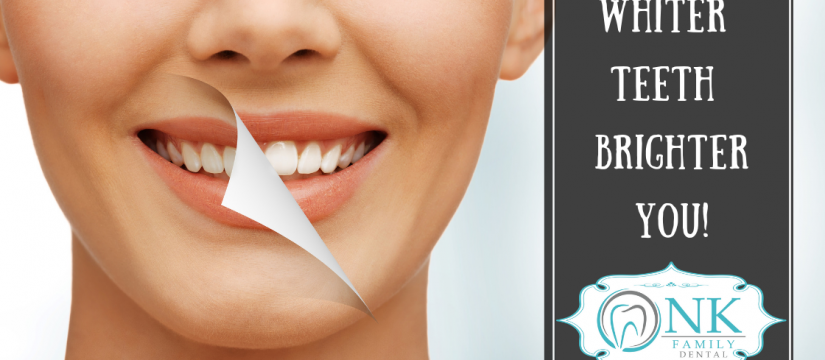
Along with veneers and braces, teeth whitening is one of the most popular and affordable cosmetic dental procedures. Teeth whitening is a safe, effective method to restore a natural-appearing bright and clean appearance to your smile. There are a number of home remedies and over-the-counter products available, but none yield the instant results equal to professional treatment.
Benefits of teeth whitening
As with any cosmetic procedure, improved self-image and self-confidence are the typical goals of teeth whitening. White teeth are a sign of affluence and youth. In the United States, in particular, a great deal of cultural value is placed on an attractive smile – with those who have one being considered successful, popular and trustworthy. The decision to undergo a whitening procedure may be prompted by many reasons, such as a special occasion (wedding, high school reunion, etc.) or wanting to make a good first impression on job interviews.
Compared to other cosmetic dentistry treatments – such as veneers and crowns – teeth whitening is quite affordable, and typically done in one appointment.
Causes of teeth discoloration
It seems strange that the strong, seemingly solid materials that make up our teeth would be susceptible to discoloration. On the surface of this material and hidden to the unaided eye are microscopic indentations perfect for catching food and drink particles.
The four major components of teeth are dentin, enamel, cementum and pulp. It is usually covered by enamel on the crown and cementum on the root and surrounds the entire pulp. Dentin is a yellowish color, and tends to come forward due to the translucency of enamel.
Surface stains and internal discoloration can be caused by many factors, and are extrinsic or intrinsic:
 Extrinsic is staining on the outer layer of the tooth, enamel, and can be caused by:
Extrinsic is staining on the outer layer of the tooth, enamel, and can be caused by:
- Drinks such as tea, coffee and wine
- Highly pigmented foods, like cherries
- Tobacco use
- Tartar and plaque
- Intrinsic is when the inner structure of your teeth, dentin, darkens or takes on a yellow tint. This can be due to:
- Trauma to developing teeth or internal bleeding
- Overexposure to fluoride at a young age
- A rare condition called dentinogenesis imperfecta, that causes gray, amber or purple discolorations
- If your mother used tetracycline antibiotics during the second half of pregnancy
A combination of both extrinsic and intrinsic discoloration also occurs gradually with age. As enamel naturally thins, yellowish dentin is more noticeable. Similarly, brittle teeth may chip and leave dentin exposed.
Tips for preventing stains
Always swish or take a couple sips of water after consuming dark-colored drinks to assist with stain prevention. Straws are also a great alternative, as liquid bypasses the teeth. Regular dental cleanings will also assist in the removal of stains, as well as tartar and plaque build-up.
Teeth whitening myths
While it is not a surgical procedure, teeth whitening can still be a daunting procedure for some people, making misinformation common. If you have any fears or concerns, never be afraid to ask your dentist – no question is silly when it comes to your comfort and education on oral health! Here are some common teeth whitening myths you may encounter:
- Products – Over-the-counter products may have whitening qualities, but not enough to produce significant results. Pass on the overpriced gum and toothpaste!
- Whitening is permanent – This myth is a case of “too good to be true.” If discoloration was caused by food, drink and/or smoking, it will eventually recur unless changes are made. Unfortunately, the gradual yellowing that comes with aging will occur regardless. To maintain whiteness, touch-ups are recommended – but be careful not to overdo, as this can weaken enamel and cause sensitivity over time. Your dentist can advise you on the recommended frequency of professional whitening treatments.
- DIY treatments can achieve the same results – There are too many home remedies to list, but almost every one has a drawback. For example, baking soda does nothing, while citrus fruit-based remedies actually eat away at your enamel, causing permanent damage.
- The stronger the better – While true, using a ultra-strength whitening treatment for a shorter period of time can be extremely damaging. Again, teeth whitening treatments performed by your dentist will be applied correctly, with any follow-up treatments deemed appropriate.
- Whitening is for everyone – False! People are quick to jump to whitening treatments as a quick solution, but several factors need to be considered. Teeth whitening should not be performed on children, as it may damage live dental tissue. For adults, it depends on the condition of your teeth. Your dentist will be able to accurately recommend another option, or resolve any issues before performing a whitening treatment.
Whether it is for a special occasion or personal pampering, NK Family Dental offers premier teeth whitening and cosmetic dentistry services. We utilize Zoom and Opalescence whitening treatments, which can make teeth up to eight shades whiter in just one application. Contact us today to schedule an appointment, and leave our office with a bright, confident smile!
